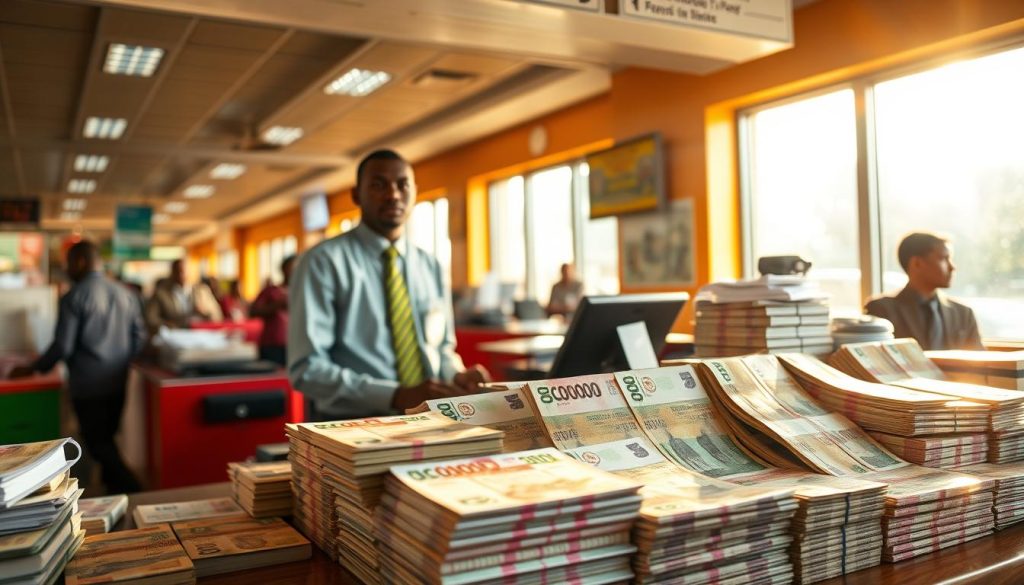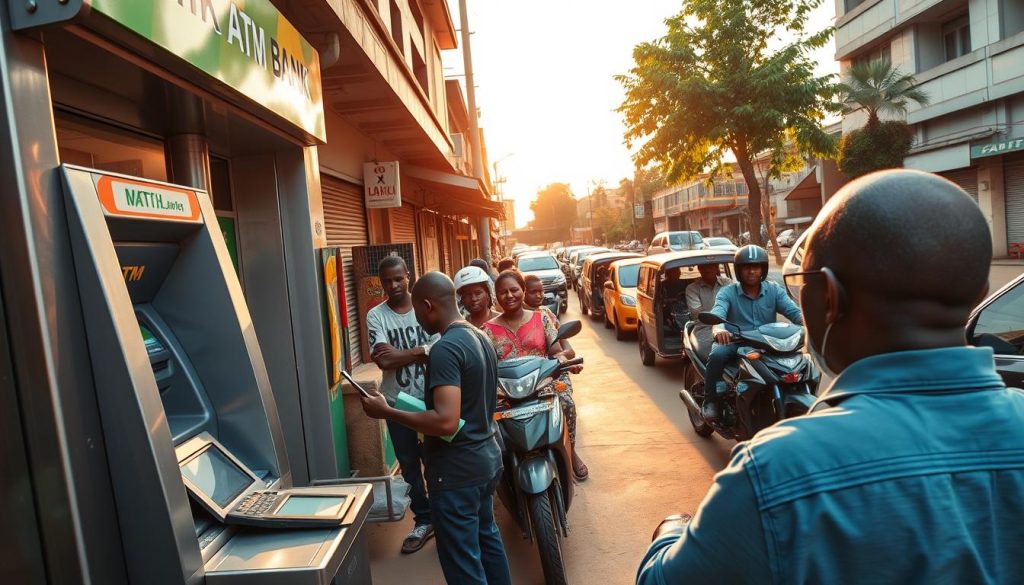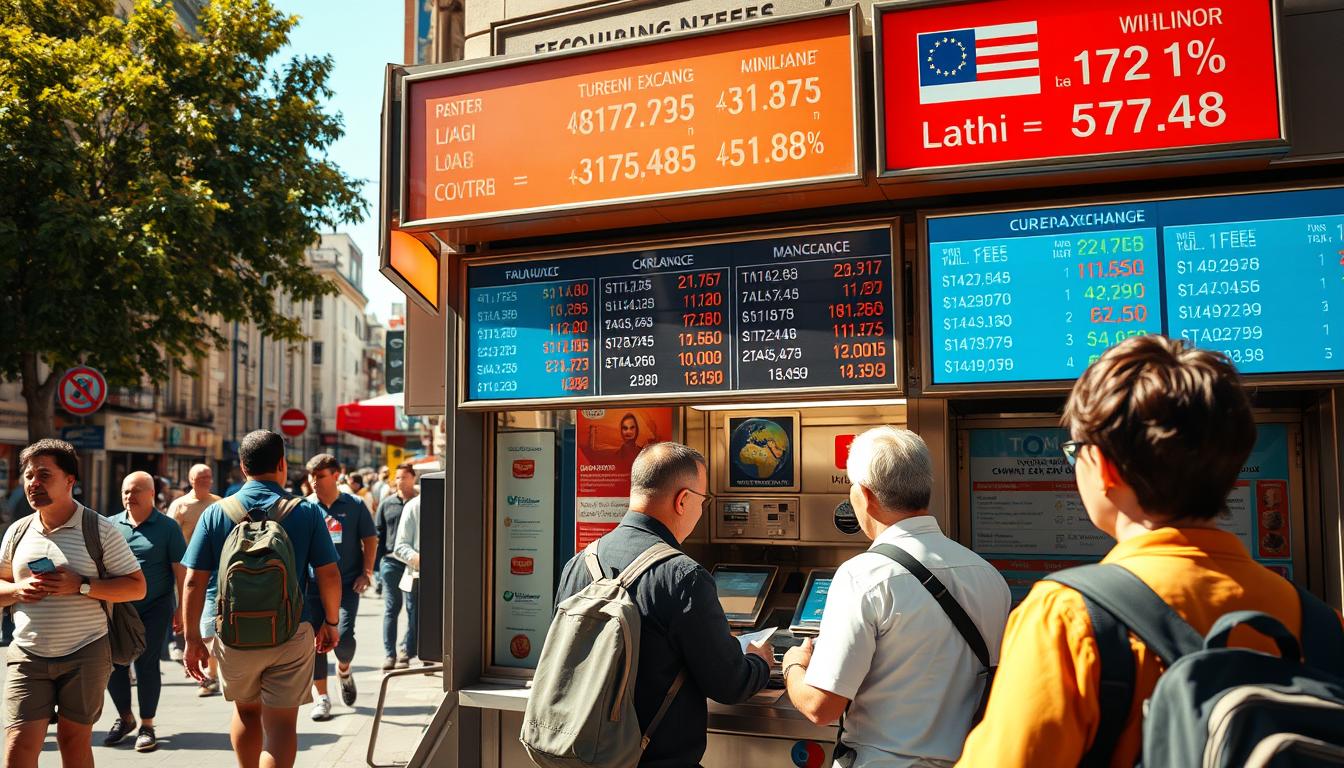✓ Accommodations ✓ Flights ✓ Rental Cars ✓ Tours & Activities
Did you know that the exchange rate for the Ugandan Shilling (UGX) can vary significantly depending on where you exchange your money? This small detail can make a big difference in your travel budget. Knowing how to manage your currency effectively is key to a stress-free journey.
Before you arrive, it’s wise to check the mid-market rate. This is the rate banks use to exchange USD to UGX, and it helps you avoid marked-up fees. Pre-exchanging your money can also save you time and hassle once you land.
Using a card abroad is convenient, but it’s not always accepted in rural areas. Carrying some local cash ensures you’re prepared for any situation. With these tips, you’ll be ready to explore without worrying about your finances.
Introduction to Uganda’s Currency Landscape
Navigating the financial system in a new country can be challenging without the right knowledge. Understanding the local currency landscape is key to managing your cash and ensuring smooth transactions. The Ugandan Shilling (UGX) is widely accepted, but knowing where and how to exchange your money can save you time and money.

Cash remains essential for most transactions, especially in rural areas. While cards are accepted in urban centers, many small vendors and taxis prefer cash. Carrying local currency ensures you’re prepared for any situation, from tipping to small purchases.
When it comes to exchange, you have several options. Banks typically offer the best rate, but forex bureaus and airport providers are more convenient. Be cautious of dynamic currency conversion, which can add hidden fees to your payment.
Currency fluctuations can affect your daily expenses. Monitoring the mid-market rate helps you get the most value for your money. Whether you’re using a bank or an exchange provider, always compare rates to avoid unnecessary costs.
“Understanding local exchange practices is vital for a safe and stress-free journey.”
By familiarizing yourself with the financial environment, you’ll be better equipped to handle your money wisely. This knowledge not only saves you from overpaying but also ensures you’re ready for any financial scenario during your trip.
Understanding the Ugandan Shilling
The Ugandan Shilling has a rich history tied to the nation’s identity. Introduced in 1966, it replaced the East African Shilling and became a symbol of economic independence. Today, it’s the backbone of daily transactions, from markets to major purchases.

History and Issuance
The shilling’s journey began with the Bank of Uganda, which oversees its issuance. This transition marked a significant step in the country’s financial evolution. Understanding this history helps you appreciate the currency’s role in the economy.
Before the shilling, the East African Shilling was used across multiple countries. The change allowed for greater control over monetary policy. This move also reflected the nation’s growing independence and self-reliance.
Denominations and Design Features
The shilling comes in various denominations, from coins to high-value banknotes. Each design features cultural symbols, showcasing the country’s heritage. For example, banknotes often depict local wildlife and historical figures.
- Coins: Available in smaller values, ideal for everyday transactions.
- Banknotes: Range from 1,000 to 50,000 shillings, catering to larger purchases.
When exchanging your money, it’s helpful to know these denominations. This knowledge ensures you’re prepared for any transaction, whether you’re tipping or buying souvenirs.
By understanding the shilling’s history and design, you’ll navigate your finances with confidence. This guide ensures you’re well-equipped to handle the local currency during your travels.
Preparing Your Finances for Uganda Travel
Planning your finances before traveling can make all the difference in your trip. Exchanging your money in advance ensures you’re ready to explore without worrying about currency exchange hassles. It also helps you avoid poor rates at airports or hotels.

Exchanging USD for UGX Before Departure
Exchanging your USD for local currency before you leave saves both time and money. Airport and hotel rates often come with high fees. Instead, visit a bank or reputable forex bureau in your city for better deals.
Carrying some cash ensures you’re prepared for immediate expenses like transportation or tips. It’s also a good idea to check the mid-market rate to understand the fair cost of exchange.
Comparing Exchange Providers and Rates
Not all currency exchange providers offer the same rates. Researching options in city centers can help you find the best deal. Compare quotes from banks, forex bureaus, and online platforms to minimize fees.
Using a travel debit card can be convenient, but it’s essential to check withdrawal limits and atm fees. Some cards offer competitive rates, while others may add hidden costs.
By planning ahead, you’ll maximize your budget and enjoy a stress-free journey. Smart financial decisions start with understanding your options and comparing them carefully.
Uganda: Ultimate Travelers Guide to Currencies & Payments
Managing your money effectively is essential for a smooth and enjoyable trip. Whether you’re staying in a hotel or exploring local markets, having the right currency on hand ensures you’re prepared for any situation.
While cards are accepted in urban areas, cash remains the preferred option for small transactions and tipping. Make sure to carry enough local currency to avoid inconvenience. Using a Wise Multi-Currency Card can also help you save on foreign transaction fees.
Dynamic currency conversion can add hidden fees to your payments. Always choose to pay in the local code (UGX) to avoid unnecessary costs. This simple step can save you a significant amount during your trip.
Here’s a quick comparison of payment options to help you decide the best approach:
| Option | Pros | Cons |
|---|---|---|
| Cash (UGX) | Widely accepted, no fees | Risk of loss or theft |
| Travel Card | Convenient, competitive rates | Limited acceptance in rural areas |
| Credit Card | Secure, easy to track expenses | High foreign transaction fees |
By planning ahead and choosing the right option, you can enjoy your trip without worrying about financial hassles. Make sure to monitor exchange rates and carry a mix of cash and cards for flexibility.
“Having the right currency on hand is the key to a stress-free travel experience.”
With these tips, you’ll be well-prepared to handle your finances wisely and make the most of your journey.
Payment Options in Uganda
When traveling, understanding payment options can save you time and money. Knowing the best ways to pay locally ensures a smooth and hassle-free experience. Whether you’re shopping at markets or dining at restaurants, having the right provider and method is key.

Using Debit and Credit Cards Locally
Debit and credit cards are widely accepted in urban areas, especially at hotels and larger businesses. However, not all tourist spots or rural vendors accept them. Using a travel debit card, like those from Wise, can offer competitive conversion rates and lower fees.
Always check with your card provider about foreign transaction fees. Some cards may charge extra for international use. It’s also a good thing to notify your bank about your travel plans to avoid any unexpected card blocks.
Carrying Cash for Small Purchases and Tipping
Cash remains essential for small purchases, tipping, and transactions in rural areas. Local denominations range from 1,000 to 50,000 shillings, making it easy to handle everyday expenses. Carrying smaller notes is especially useful for tipping or buying snacks.
When exchanging money, choose a reliable provider to get the best rates. Avoid exchanging at airports or hotels, as they often charge higher fees. Having enough cash on hand ensures you’re prepared for any situation.
By balancing card and cash usage, you can enjoy a stress-free trip. This approach not only saves you money but also ensures you’re ready for any financial scenario.
Optimizing Currency Exchange Rates
Getting the best exchange rates can make your trip more affordable and stress-free. Monitoring the mid-market rate is a key strategy to ensure you’re not overpaying. This rate, used by banks, reflects the true value of the Ugandan Shilling and helps you avoid marked-up fees.
To plan effectively, compare rates from multiple providers. Banks and online platforms often offer better deals than airports or hotels. Using a travel debit card, like those from Wise or Travelex, can automatically secure competitive rates and reduce fees.
Monitoring the Mid-Market Rate
Fluctuations in the Ugandan Shilling can impact your travel budget. By tracking the mid-market rate, you’ll know when to exchange your money for the best value. Apps and websites like XE or OANDA provide real-time updates, making it easy to stay informed.
When dining at a restaurant or shopping, paying in local currency avoids dynamic conversion fees. Always choose UGX over USD to save on unnecessary costs. This simple step can add up to significant savings during your trip.
“Using a travel card with mid-market rates ensures you get the most value for your money.”
By planning ahead and monitoring rates, you can optimize your currency exchange process. This approach not only saves money but also ensures you’re prepared for any financial scenario during your travels.
Managing ATMs and Card Transactions
Handling ATMs and card transactions during your travels can simplify your financial management. Knowing where to find secure ATMs and how to avoid unnecessary fees ensures a smooth experience. This guide will help you navigate these aspects with ease.
Finding Secure ATMs in Urban Areas
When using ATMs, prioritize those attached to banks or located in well-populated areas like malls. These are often safer and less prone to skimming devices. In major cities, banks like Stanbic and Barclays are reliable options for debit card withdrawals.
Always check for the PLUS or Visa logo on the ATM. These machines are more likely to accept international cards. Notify your bank about your trip to avoid unexpected card blocks due to foreign transactions.
Avoiding Dynamic Currency Conversion Fees
Dynamic currency conversion (DCC) can add extra fees to your transaction. Always choose to pay in the local official currency (UGX) instead of your home currency. This simple step can save you money during your trip.
When using a debit or credit card, double-check the receipt to ensure the charge is in UGX. Some merchants may default to DCC, so it’s worth confirming before completing the payment.
“Paying in the local currency ensures you get the best exchange rate and avoid hidden fees.”
By following these tips, you can manage your finances effectively and focus on enjoying your journey. Monitoring your bank account for unusual activity also adds an extra layer of security.
Leveraging International Money Transfers & Mobile Money
Sending and receiving money internationally has never been easier with modern tools. Whether you’re planning a trip or supporting loved ones, understanding your options can save you time and money. This guide will help you need know the best ways to transfer funds and use mobile money platforms effectively.
Using Low-cost Transfer Services
Services like Wise, WorldRemit, and Western Union offer affordable ways to send foreign currency. These platforms provide competitive exchange rates and lower fees compared to traditional banks. For example, Wise uses the mid-market rate, ensuring you get the best value for your money.
Before choosing a provider, compare fees and transfer times. Some services allow you to send money in advance, which can be helpful for planning your trip. Always check for hidden costs, such as intermediary bank fees, to avoid surprises.
Benefits of Mobile Money Platforms
Mobile money platforms like MTN Mobile Money and Airtel Money have revolutionized local transactions. These services reduce the need for cash, making payments faster and more secure. You can use them for everything from groceries to utility bills.
One major advantage is accessibility. Even in rural areas, mobile money is widely accepted. It’s also easy to set up—all you need is a phone and a valid ID. This makes it a convenient option for both locals and travelers.
“Mobile money has transformed the way people handle finances, offering a secure and efficient alternative to cash.”
By leveraging these tools, you can manage your finances with ease. Whether you’re sending money Uganda or making local payments, these platforms provide flexibility and control.
Conclusion
Making the most of your trip starts with smart financial planning. Understanding the local currency and planning your payment methods in advance is essential. This ensures you’re prepared for any situation, from markets to small purchases.
Careful planning helps you avoid extra fees and get the best value for your money. Monitoring the mid-market rate and choosing secure, cost-effective payment methods can save you significantly. Always carry some local cash, as it’s widely accepted and useful for tipping or rural areas.
Using a travel debit card alongside cash offers flexibility and convenience. It also helps you avoid foreign transaction fees and dynamic currency conversion charges. Staying informed on the latest exchange rates ensures you’re always getting the best deal.
By following these tips, you’ll leave fully prepared for a smooth financial experience. Smart planning not only saves money but also lets you focus on enjoying your journey.
The above is subject to change.
Check back often to TRAVEL.COM for the latest travel tips and deals.






